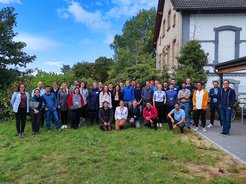The workshop was held at the Max Planck Institute for Evolutionary Biology from September 14-16, 2022. This was organized by Florence Bansept, Michael Sieber, and Román Zapién-Campos with support from Arne Traulsen and the Department of Evolutionary Theory. About 40 participants from 13 countries and all career stages gathered in Plön to discuss topics related to the emerging field of science that is theoretical research on microbiomes.

"Understanding the ecological and evolutionary processes involved in the dynamics of host-associated microbial communities is a fundamental step to enable clinical, industrial and environmental applications," says Florence Bansept, postdoctoral fellow in the Department of Evolutionary Theory. Thus, this workshop paid special attention to the mathematical methods used in this field - from stochastic to metabolic modeling - and their recent developments, as well as to linking these methods to experimental data.
Leading researchers in the field presented their research and the methods developed in their laboratories. These included Jonas Cremer (Stanford, USA), Isabel Gordo (I. Gulbenkian, Portugal), Jacopo Grilli (ICTP, Italy), Christoph Kaleta (CAU, Germany), Claude Loverdo (CNRS, France), Nic Vega (U. Emory, USA), and Simon Van Vliet (U. Basel, Switzerland). Additional talks and posters complemented this panel with topics ranging from the gut microbiome to cancer research.
Among other topics, participants discussed the various factors that determine the composition of the microbiome, including the physical and immunological constraints that hosts impose on their microbes, and how microbiomes evolve with their hosts.
Lively outdoor activities, open discussion sessions, and social times helped to deepen connections among the researchers gathered in Plön.
